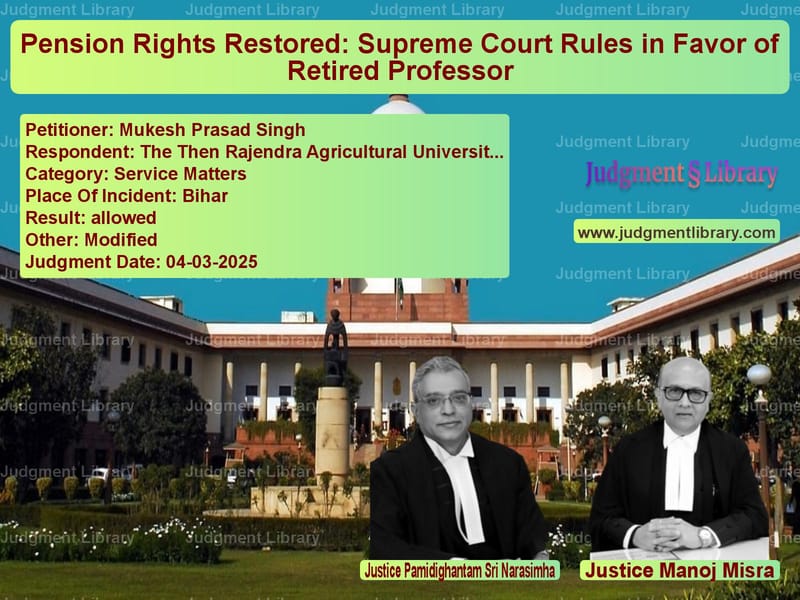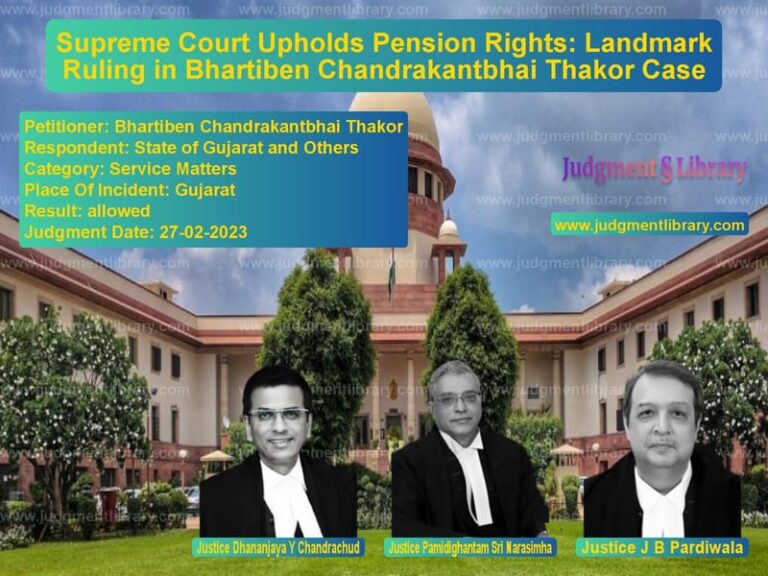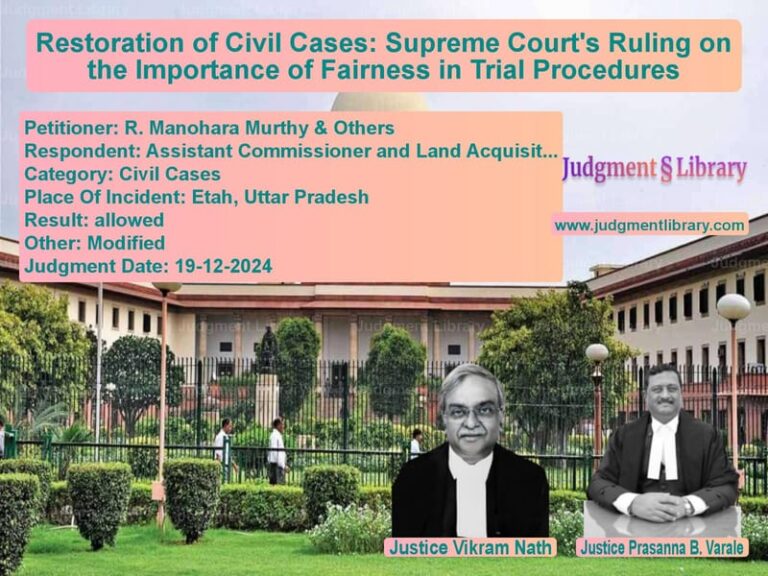Pension Rights Restored: Supreme Court Rules in Favor of Retired Professor
The Supreme Court of India has delivered a significant judgment in Mukesh Prasad Singh v. The Then Rajendra Agricultural University, reinstating the pension rights of a retired professor who was denied benefits under the General Provident Fund-cum-pension-cum-gratuity scheme. The case underscores the importance of clear administrative policies in service matters and the duty of employers to honor statutory commitments to employees.
Background of the Case
The case arose from a dispute between the appellant, Mukesh Prasad Singh, and his employer, the Rajendra Agricultural University (now Dr. Rajendra Prasad Central Agricultural University). The appellant, who was appointed as a Junior Scientist cum Assistant Professor in 1987, contested the university’s refusal to grant him pension benefits upon superannuation.
The appellant filed a writ petition after discovering that his name was excluded from the list of employees under the General Provident Fund-cum-pension-cum-gratuity scheme, despite provisions in the university statutes entitling him to pension benefits. His petition was dismissed by a single judge of the Patna High Court on February 27, 2019, and his appeal was subsequently rejected on November 24, 2022. He then approached the Supreme Court for relief.
Petitioner’s Arguments
The appellant argued that:
- The University Statutes of 1976 clearly provided for pension benefits unless an employee specifically opted for the Contributory Provident Fund (CPF).
- He had never opted for the CPF scheme and, therefore, should have been automatically enrolled in the General Provident Fund-cum-pension-cum-gratuity scheme.
- The university’s decision to exclude him was arbitrary and against established precedents where similarly placed employees were granted pension benefits.
- Several previous cases, including Arjun Kumar v. State of Bihar, had ruled in favor of employees who had not opted for CPF but were still denied pension.
Respondent’s Arguments
The university contended that:
- The appellant had multiple opportunities (1990, 1995, 1996, and 2008) to opt for the pension scheme but failed to do so.
- Since he had not explicitly selected the pension scheme, he remained under the CPF scheme.
- The High Court had correctly dismissed his petition as per university regulations.
Supreme Court’s Analysis
Interpretation of University Statutes
The Supreme Court examined Chapter 16 of the University Statutes and found that the default scheme for university employees was the General Provident Fund-cum-pension-cum-gratuity scheme unless an employee specifically opted for CPF.
“The statutory provisions are clear that employees appointed by the university are entitled to pension unless they explicitly choose the Contributory Provident Fund.”
The Court criticized the High Court’s reasoning, stating that non-exercise of an option does not automatically place an employee under CPF when the default rule grants pension benefits.
Precedents Supporting the Petitioner
The Court cited several previous cases where employees in similar situations were granted pension benefits:
- Arjun Kumar v. State of Bihar: Held that employees not opting for CPF should be covered under the pension scheme.
- Dr. Vijay Kumar Jaiswal v. Bihar Agriculture University: Reinforced that universities cannot deny pension benefits based on procedural lapses when statutes provide for them.
- Ramjanam Prasad v. Rajendra Agricultural University: Found that exclusion from the pension scheme must be justified through explicit evidence.
Failure of University to Adhere to Its Own Orders
The Court noted that an Office Order issued by the university in 2008 required non-CPF employees to be automatically enrolled in the pension scheme. Since the appellant had not opted for CPF, his exclusion from the pension scheme was a violation of this order.
Final Judgment
The Supreme Court allowed the appeal, setting aside the High Court’s decision. It ruled:
“The appellant shall be provided retiral benefits under the General Provident Fund-cum-pension-cum-gratuity scheme in accordance with law. Necessary computation and disbursement shall be completed within four months.”
Key Takeaways from the Judgment
- Default pension entitlement: Employees cannot be excluded from pension benefits without explicitly opting for an alternative scheme.
- Employer’s duty: Institutions must adhere to their own regulations and precedents when processing pension entitlements.
- Judicial consistency: The Supreme Court emphasized that similarly placed employees must be treated equitably.
- Timely compliance: The university must process and disburse the appellant’s pension within four months.
Conclusion
The Supreme Court’s ruling in this case reinforces the importance of protecting employees’ rights against arbitrary administrative decisions. The judgment serves as a crucial precedent for service matters, ensuring that statutory provisions for pension and retirement benefits are upheld without unjustified exclusions. This ruling will likely influence future disputes related to employment benefits in educational institutions and other public sector organizations.
Petitioner Name: Mukesh Prasad Singh.Respondent Name: The Then Rajendra Agricultural University (Now Dr. Rajendra Prasad Central Agricultural University) & Ors..Judgment By: Justice Pamidighantam Sri Narasimha, Justice Manoj Misra.Place Of Incident: Bihar.Judgment Date: 04-03-2025.
Don’t miss out on the full details! Download the complete judgment in PDF format below and gain valuable insights instantly!
Download Judgment: mukesh-prasad-singh-vs-the-then-rajendra-ag-supreme-court-of-india-judgment-dated-04-03-2025.pdf
Directly Download Judgment: Directly download this Judgment
See all petitions in Pension and Gratuity
See all petitions in Employment Disputes
See all petitions in Public Sector Employees
See all petitions in Recruitment Policies
See all petitions in Judgment by P.S. Narasimha
See all petitions in Judgment by Manoj Misra
See all petitions in allowed
See all petitions in Modified
See all petitions in supreme court of India judgments March 2025
See all petitions in 2025 judgments
See all posts in Service Matters Category
See all allowed petitions in Service Matters Category
See all Dismissed petitions in Service Matters Category
See all partially allowed petitions in Service Matters Category







